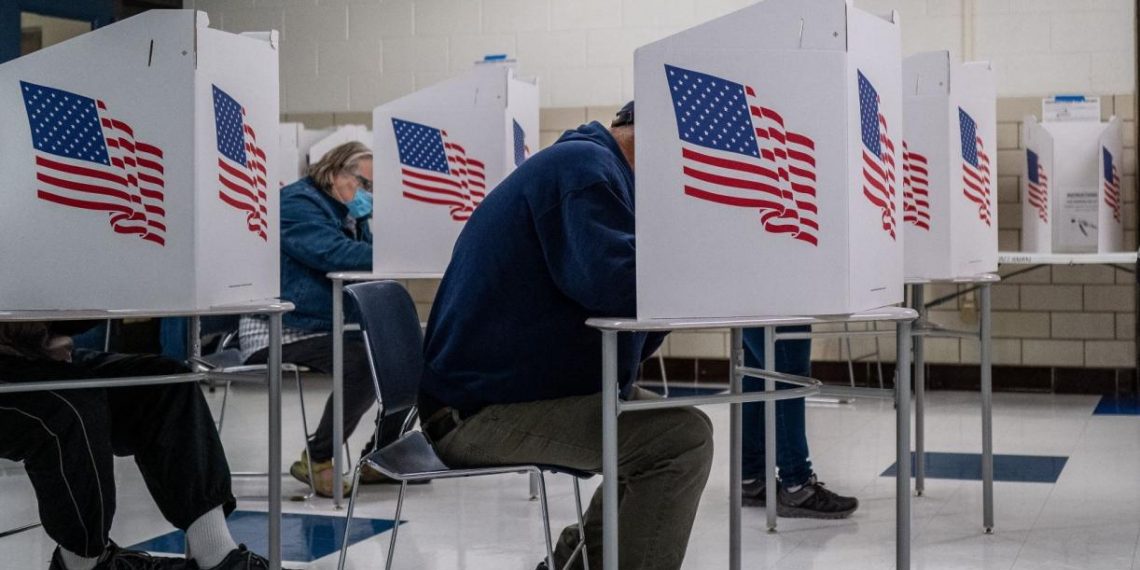It’s about to get harder for many people to cast ballots in elections.
Across the country, new laws in 17 states will reduce the number of polling places, impose new ID regulations, complicate the vote-by-mail process and introduce a range of other barriers that undermine the right to vote. To prevent enactment of another voter suppression law, a group of Texas legislators left the state to deny a quorum in the Texas House and came to Washington, D.C. to urge Congress to act to protect voting rights.
Voting is the most fundamental right for citizens in a democracy. These new laws amount to restrictions on that right — especially for Black people and other people of color, who will be disproportionately harmed.
The people who created these laws often say they’re necessary to prevent voter fraud, but they’re unable to cite any evidence to support this claim.
The more likely reason? These laws were created to keep people, and people of color in particular, from the voting booths in an attempt to retain power in the hands of politicians who represent a minority of eligible voters.
This is not democracy.
Congress passed the Voting Rights Act in 1965 to end the historical racial discrimination in voting. That legislation was reauthorized five times, most recently in 2006 when it passed in the Senate unanimously and was signed by President George W. Bush.
This landmark legislation was decimated in the 2013 Supreme Court decision, Shelby County v. Holder, which removed the requirement to have the U.S. Justice Department review any changes to local election laws in states or localities with a history of voter suppression.
More recently, those repeatedly-affirmed voter protections were jeopardized on July 1, when the U.S. Supreme Court upheld Arizona’s ban on third-party ballot collections and the counting of ballots cast in the wrong precinct. The six justices who approved Arizona’s regulations argued that the bans are lawful as long as voters still have some way, even if more onerous, to cast a ballot.
In a blistering dissent, Justice Elena Kagan wrote: “Wherever it can, the majority gives a cramped reading to broad language. And then it uses that reading to uphold two election laws from Arizona that discriminate against minority voters.”
There are two proposals in Congress right now to push back against laws that suppress voters: The “John Lewis Voting Rights Advancement Act” would restore the effectiveness of the Voting Rights Act in response to Supreme Court decisions that have undermined it. The “For the People Act” would require states to offer same-day voter registration for federal elections, hold early voting, make Election Day a federal holiday and more.
In a speech at the National Constitution Center in Philadelphia on July 13th President Biden renewed his call for Congress to defend democracy by passing these bills. Both bills have majority support in both the House and the Senate, but an effort led by Senate Minority Leader Mitch McConnell will likely block them. That is unless the Senate were to do away with the filibuster, which has its own racist history and appears unlikely at this time.
This is voter suppression and voter subversion, occurring in real time before our eyes. It is a throwback to the Jim Crow voting era. It’s racist and disproportionately harms people of color.
WRI opposes these anti-voting laws because it’s committed to denouncing racism in any form. Rejecting these laws and standing up for protecting voters’ access to the polls is the right thing to do.
Additionally, voting rights are essential to achieving environmental justice. Climate change and other environmental hazards, like air pollution, have a disproportionate impact on people of color and other vulnerable communities. Their voices must be included in decisions made by our elected officials on how the U.S. government handles environmental issues.
The data are clear: Black Americans are 75% more likely than white Americans to live near commercial facilities that produce noise, odor, traffic or emissions. In Flint, Michigan, it was mostly Black children who consumed lead-laced water when local officials tried to save money by switching its water source. When climate-related disasters occur, wealth inequality between white people and people of color deepens. Cleanup crews that cleared oil out of the Gulf of Mexico after the Deepwater Horizon oil rig exploded in 2010 dumped much of that oil in areas where people of color lived.
When access to polling stations is limited, many Black voters and other voters of color lose their Constitutionally-guaranteed right to cast ballots to support candidates and measures that matter to them. For many of these voters that includes environmental issues.
People of color are more concerned about climate change than are white voters, according to data collected by the Yale Program on Climate Change Communication. Latino voters are more likely to contact government officials about climate change, while more Black Americans than white Americans say they are alarmed about what’s happening to the climate. A political candidate’s stance on the climate crisis is more of a concern to voters of color than it is to white voters.
Civil rights leader and former NAACP president Ben Jealous puts it this way: “There is no green vote without the Black and Brown vote.”
WRI is a non-partisan organization. We don’t take sides when it comes to political parties. But voting rights shouldn’t be a partisan issue.
Our position is clear: Congress must take action to protect voting rights and block racist voter suppression laws because doing so is fundamental to democracy and the health of the United States.



